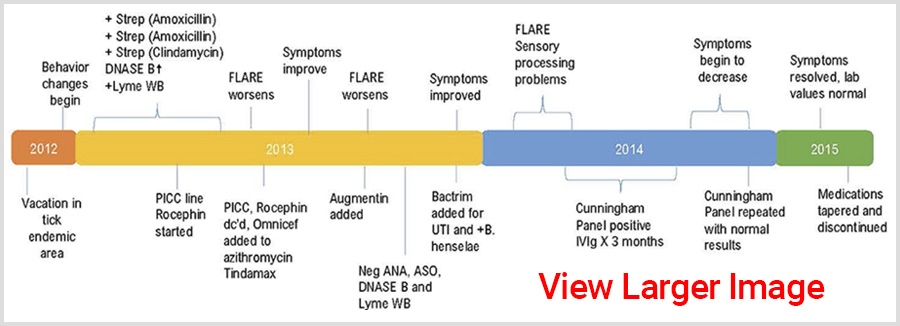Case Report: PANDAS and Persistent Lyme Disease With Neuropsychiatric Symptoms: Treatment, Resolution, and Recovery
As evidenced by this patient’s recovery and resolution of symptoms, treating both the Lyme infection and streptococcal infection, as well as treating the underlying autoimmune etiology of the patient’s neuropsychiatric symptoms resulted in a successful outcome.
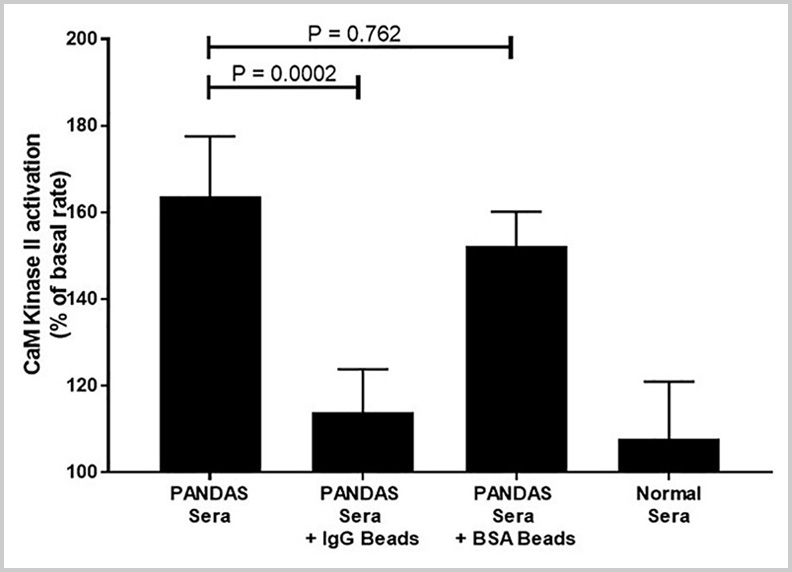
Autoantibody Biomarkers for Basal Ganglia Encephalitis in Sydenham Chorea and Pediatric Autoimmune Neuropsychiatric Disorder Associated With Streptococcal Infections
The results of this study strongly suggest that both PANDAS and Sydenham Chorea are provoked by cross reactive anti-neuronal antibodies. “Our results suggest that the panel of four antineuronal antibodies and CaMKII activation assays successfully identify acute illness in PANDAS, providing opportunities for rapid and accurate diagnosis and treatment,” the authors conclude.
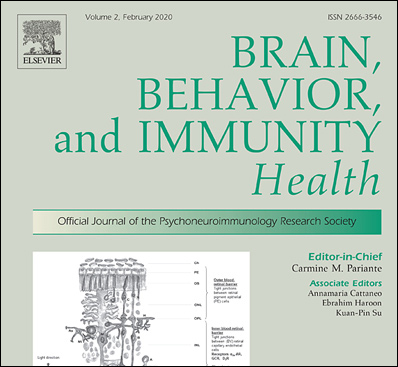
Anti-lysoganglioside and other anti-neuronal autoantibodies in post-treatment Lyme Disease and Erythema Migrans after repeat infection
This study, which examines Lyme disease and the immune system, illustrates molecular mimicry targeting neural tissue after Borrelia burgdorferi (Bb) infection. The authors conclude that patients with Lyme disease have a greater frequency of certain anti-neuronal autoantibodies and functional neuronal activation compared to community controls without a history of Lyme disease.
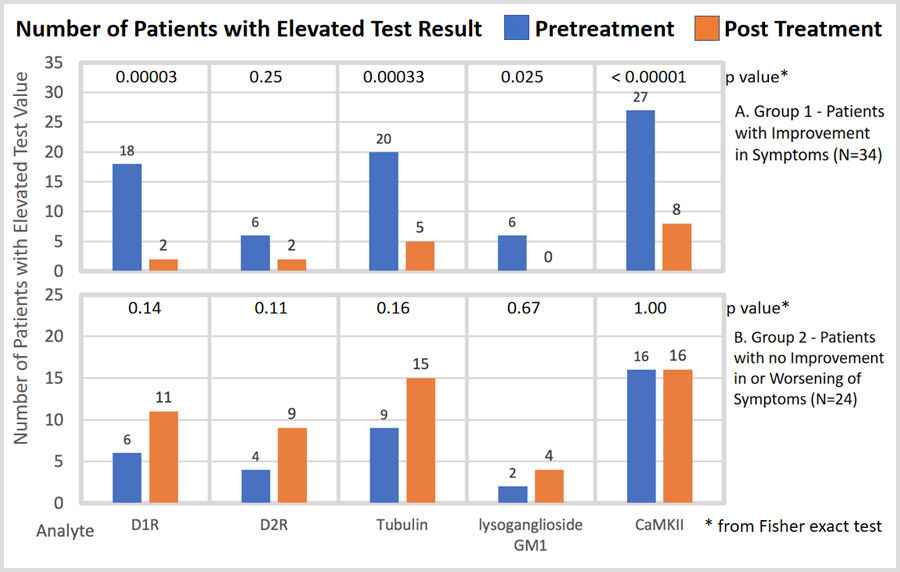
Evaluation of the Cunningham Panel™ in pediatric autoimmune neuropsychiatric disorder associated with streptococcal infection (PANDAS) and pediatric acute-onset neuropsychiatric syndrome (PANS): Changes in antineuronal antibody titers parallel changes in patient symptoms
This newly published study examined the correlation in patient pre- and post-treatment symptoms with changes in anti-neuronal autoantibody titers and the neuronal cell stimulation assay in the Cunningham Panel in patients with Pediatric Autoimmune Neuropsychiatric Disorder Associated with Streptococcal Infection (PANDAS), and Pediatric Acute-onset Neuropsychiatric Syndrome (PANS).1
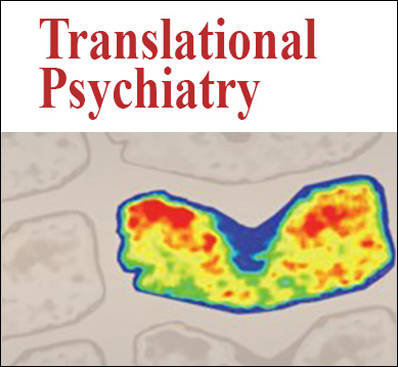
Intravenous Immunoglobulin for the treatment of autoimmune encephalopathy in children with autism
This study examines antineuronal antibodies in IVIG responders and supports the classification of a neuroimmune subgroup in patients with ASD. The majority of the ASD patients in this cohort demonstrated elevations in brain-specific autoantibodies measured by the Cunningham Panel™, along with an elevation in the activation of CAMKII. 2
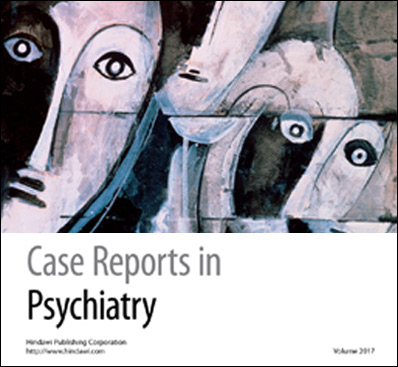
Case Report: An Atypical Presentation of Pediatric Acute Neuropsychiatric Syndrome Responding to Plasmapheresis Treatment
This article published in the June 2018 issue of Case Reports in Psychiatry involves a complex case of a 15-year-old girl who abruptly developed multiple neurologic and psychiatric symptoms leading to an initial diagnosis of schizophrenia. The authors point out that although the patient’s anti-NMDAR antibody test was negative and MRI’s were normal, the Cunningham Panel™ was positive with all 4 of the ELISA assays elevated and the CaM Kinase II borderline. These results supported the diagnosis of an autoimmune-based neuropsychiatric disorder.3

Six-month Neurological and Psychiatric Outcomes in 236,379 Survivors of
COVID-19
This study provides evidence for substantial neurological and psychiatric morbidity following COVID-19 infection, according to the authors. Out of 236,379 patients with COVID-19, estimated incidence of neurological or psychiatric sequelae at 6 months was 33.6%, with 12.8% receiving their first such diagnosis. The risks were greatest in patients who had severe COVID-19, including those who were hospitalized or experienced encephalopathy.
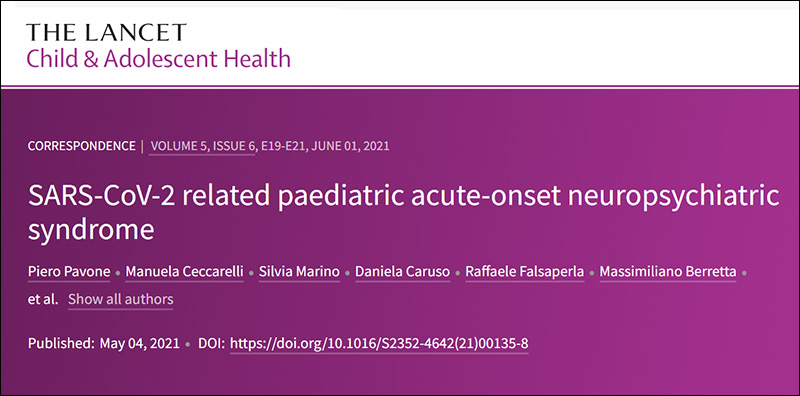
SARS-CoV-2 related Paediatric Acute-onset Neuropsychiatric Syndrome
This article describes two cases involving adolescents who developed symptoms of Pediatric Acute-onset Neuropsychiatric Syndrome (PANS) 2 weeks after testing positive for COVID-19. Both patients developed a sudden onset of psychiatric symptoms including OCD, emotional lability, and tics. “Our two cases show a temporal correlation between COVID-19 and the onset of PANS. Therefore, it is possible that, in these cases, the SARS-CoV-2 virus has caused PANS, although this cannot be confirmed,” the authors conclude.
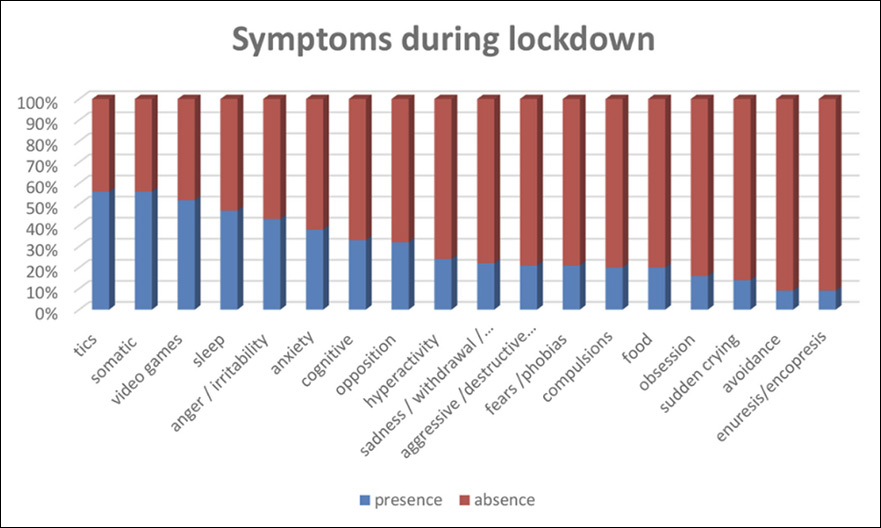
The Impact of the COVID-19 Epidemic During the Lockdown on Children With the Pediatric Acute-Onset Neuropsychiatric Syndrome (PANDAS/PANS): The Importance of Environmental Factors on Clinical Conditions
This study found that out of 108 children with PANS/PANDAS, 71% reported an increase in symptoms during the COVID-19 lockdown period. These findings are contrary to the authors’ hypotheses that patients would experience a stabilization or reduction in symptoms due to decreased exposure to infectious agents. Stressful events can contribute to worsening of the disease, therefore environmental, family, and social changes during the clinical course of illness should be investigated.

Inflammation in the Neurocircuitry of Obsessive-Compulsive Disorder
This is believed to be the first study demonstrating inflammation within the neurocircuitry of OCD. Findings suggest that the autoimmune/neuroinflammatory theories of OCD should extend beyond the basal ganglia to include the cortico-striato-thalamo-cortical circuit.
Immunomodulatory therapies should be investigated in adult OCD, rather than solely childhood OCD, particularly in cases with prominent distress when preventing compulsions.
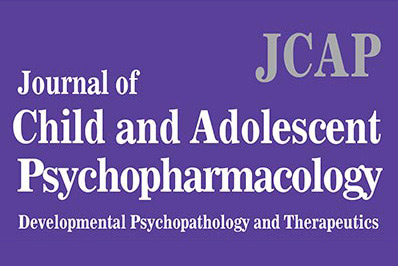
Immune-Related Comorbidities in Childhood-Onset Obsessive Compulsive Disorder: Lifetime Prevalence in the Obsessive Compulsive Disorder Collaborative Genetics Association Study
These data suggest high rates of streptococcal-related and other immune-mediated diseases in patients with childhood-onset OCD…and raises the possibility of an association between childhood-onset OCD and central nervous system infection or inflammation together with poststreptococcal autoimmunity.

Inflammatory dysregulation of monocytes in pediatric patients with obsessive-compulsive disorder
These study results strongly support the involvement of an enhanced proinflammatory innate immune response in the etiopathogenesis of early-onset OCD.
The enhanced activation of the innate immune system may be triggered by exposure to immunomodulatory stimuli like stress or infections leading to an increased production of cytokines that mediate the inflammatory process.

Obsessive-Compulsive Disorder: Autoimmunity and Neuroinflammation
This review highlights that OCD is associated with low-grade inflammation, neural antibodies, and neuro-inflammatory and auto-immune disorders. In some subset of OCD patients, autoimmunity is likely triggered by specific bacterial, viral, or parasitic agents with overlapping surface epitopes in CNS [central nervous system].

Anti-basal ganglia antibodies in primary obsessive–compulsive disorder: systematic review and meta-analysis
Anti-basal ganglia antibodies were 5 times more likely to be detected in the serum of individuals with primary OCD.
Odds of ABGA [anti-basal ganglia antibody] seropositivity are increased five-fold in primary OCD compared with controls, but are comparable to those associated with disorders previously associated with ABGA, providing circumstantial evidence of autoimmunity in a subset of those with primary OCD.

Clinical Management of Pediatric Acute-Onset Neuropsychiatric Syndrome (PANS)
Overview of Treatment Guidelines
Part I: Psychiatric and Behavioral Interventions
Part II: Use of Immunomodulatory Therapies
Part III: Treatment and Prevention of Infections

Clinical Evaluation of Youth with Pediatric Acute-Onset Neuropsychiatric Syndrome (PANS): Recommendations from the 2013 PANS Consensus Conference
Antineuronal Antibodies in a Heterogeneous Group of Youth and Young Adults with Tics and Obsessive-Compulsive Disorder
SCHEDULE: IN-SERVICES FOR UTILIZATION OF THE CUNNINGHAM PANEL™
We provide free medical education services to assist clinicians in better understanding the Cunningham Panel™ utilization. This service is available to individual clinicians and group practices.
- Craig Shimasaki, Richard E. Frye, Rosario Trifiletti, Michael Cooperstock, Gary Kaplan, Isaac Melamed, Rosalie Greenberg, Amiram Katz, Eric Fier, David Kem, David Traver, Tania Dempsey, M. Elizabeth Latimer, Amy Cross, Joshua P. Dunn, Rebecca Bentley, Kathy Alvarez, Sean Reim, James Appleman. Evaluation of the Cunningham Panel™ in pediatric autoimmune neuropsychiatric disorder associated with streptococcal infection (PANDAS) and pediatric acute-onset neuropsychiatric syndrome (PANS): Changes in antineuronal antibody titers parallel changes in patient symptoms. Journal of Neuroimmunology, In Press-15 February 2020. Online ahead of print https://www.jni-journal.com/article/S0165-5728(19)30352-2/fulltext
- Drew H. Barzman, Hannah Jackson, Umesh Singh, Marcus Griffey, Michael Sorter, and Jonathan A. Bernstein, “An Atypical Presentation of Pediatric Acute Neuropsychiatric Syndrome Responding to Plasmapheresis Treatment,” Case Reports in Psychiatry, June 28, 2018, Vol. 2018, doi.org/10.1155/2018/8189067
- Connery, K., Tippett, M., Delhey, L.M. et al. Intravenous immunoglobulin for the treatment of autoimmune encephalopathy in children with autism. Transl Psychiatry 8, 148 (2018). https://doi.org/10.1038/s41398-018-0214-7



